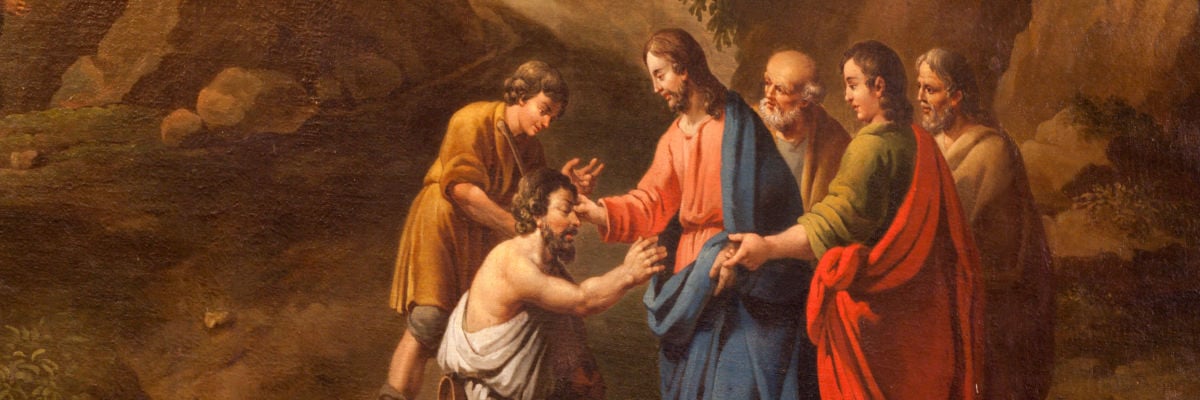
We are all called to go out to all the nations and preach the gospel of Jesus Christ. Why, then, during his earthly ministry, was Jesus so often telling people to keep mum about the work he was doing and the miracles he was performing?
The Gospels show us, time and time again, Jesus performing great works and then immediately telling those he healed not to tell anyone. He did this even as he went from village to village, even throughout Jerusalem, preaching, teaching, and performing miracles. Great crowds followed him. It was not as if his ministry was some sort of secret. So why did he insist on this attempt at clandestine ministry?
We can, of course, only speculate as to why. But as we look at some examples of this “messianic secret” from Scripture, we can approach a well-educated guess.
In the opening chapter of the Gospel of Mark we read that after Jesus healed a leper, “He sternly charged him, and sent him away at once, and said to him, ‘See that you say nothing to anyone; but go, show yourself to the priest, and offer for your cleansing what Moses commanded, for a proof to the people’” (Mark 1:43-44). Elsewhere in Mark’s Gospel, Jesus tells those he healed not even to go into the village, ordering them not to tell anyone about the miracle (cf. Mark 8:26, 30).
It is not just those Jesus heals who are told to remain silent—even the demons he casts out are commanded to hold their tongues: “’I know who you are, the Holy One of God.’ But Jesus rebuked him saying, ‘Be silent, and come out of him’ . . . And he cured many who were sick with various diseases, and cast out many demons; and he would not permit the demons to speak, because they knew him” (Mark 1:24-25, 34).
Although the messianic secret is a prominent feature in the Gospel of Mark, we see examples of it in all of the Gospels. Matthew tells us that after Jesus called Peter the rock on which the Church would be built, he “sternly ordered the disciples not to tell anyone that he was the Messiah” (Matt. 16:20).
Of course, not everyone obeyed Our Lord when asked to keep the miraculous healing secret. Luke tells us that after cleansing a leper, Jesus says told him to go
“and show yourself to the priest, and, as Moses commanded, make an offering for your cleansing, for a testimony to them.” But now more than ever the word about Jesus spread abroad; many crowds would gather to hear him and to be cured of their diseases. But he would withdraw to deserted places and pray (Luke 5:14-16).
Word did not just continue to leak out—it spread “now more than ever.” Perhaps Jesus wanted to keep a low profile in order to avoid being completely overwhelmed by crowds begging for their own healings or other favors. Perhaps he did not want to be seen as simply a miracle worker or healer.
There may be any number of reasons for Jesus’ insistence that those he healed remain quiet, but we can be confident that the Son of God had his reasons. As is made abundantly clear throughout Scripture, God’s will becomes clear at an hour of his choosing.
Throughout the Gospels we read, perhaps in anticipation of the questions that reasonable people would have about Our Lord’s actions, that his hour had not yet come. At the wedding at Cana, we read: “And Jesus said to her, ‘Woman, what concern is that to you and to me? My hour has not yet come’” (John 2:4). Later in John’s Gospel: “Jesus said to them, ‘My time has not yet come, but your time is always here’” (John 7:6).
In places, the fact that it was not the proper time yet for Jesus to be known and handed over seems to mysteriously influence the actions of those who saw him as an enemy: “Then they tried to arrest him, but no one laid hands on him, because his hour had not yet come” (John 7:30). And in his encounter with the Gadarene demoniacs, the demons shout through the possessed men, “What have you to do with us, Son of God? Have you come here to torment us before the time” (Matt. 8:29)?
In his marvelous work of Christology, Jesus of Nazareth, Pope Benedict XVI (writing as a private theologian) wrote that Jesus insisted on this secret because the success of his salvific mission depended on it. Taking as an example Jesus’ rebuke of Peter following his confession of Christ as the Messiah in Matthew 16, he writes that Jesus “forbids the disciples to speak openly of this confession [of Peter], given that it would undoubtedly have been misinterpreted in the public climate of Israel and would necessarily have led on one hand to false hopes in him and on the other hand to political action against him” (pp. 297-298). The devil attempted to persuade Christ either to run away from his mission or to become the powerful military Messiah expected by so many at the time. But Christ knew all too well his destiny upon the cross, that he would be the Paschal Lamb prefigured by temple sacrifices throughout the centuries.
Whatever his mysterious reasons for his admonishments, we know now that he is the Messiah and has accomplished our salvation through his death and glorious Resurrection. Christians are called not to keep this truth a secret, not to hide it under a bushel basket, but to preach it to the ends of the earth. The messianic secret is out.



